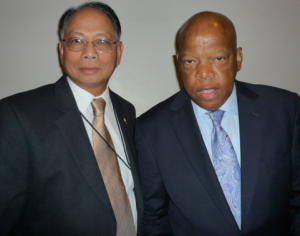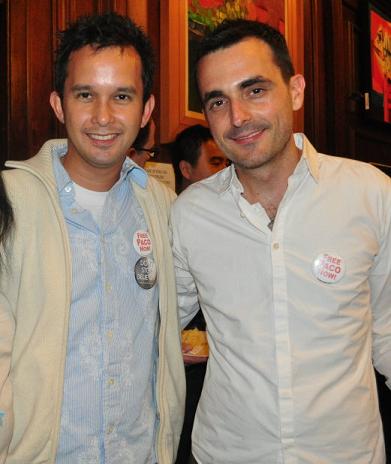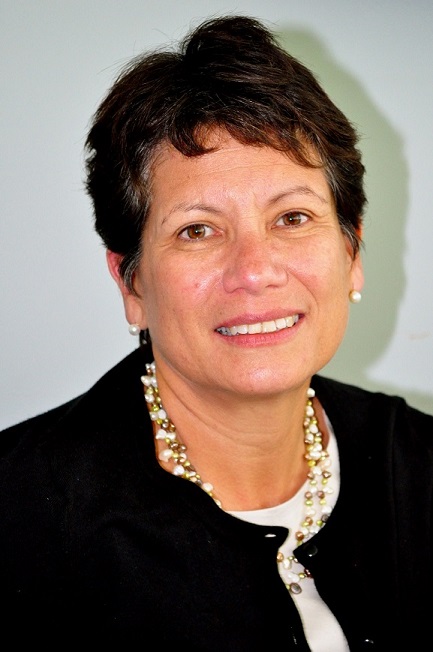The significance of ‘Selma’ in wake of Ferguson
By Wendell Gaa
I remember staring at a photo with much pride of my father, Ambassador Willy Gaa, standing together with one of the greatest leaders of the Civil Rights Movement, Congressman John Lewis of Georgia. The two met in 2010 back when my Dad was still the Philippine envoy to Washington D.C.
And thinking nowadays that despite the social strife that has occurred in the wake of the police killings of young African-American men in Ferguson, Missouri and here in New York City, seeing someone like Congressman Lewis get to the position where he is now after so many years of struggle is just one example of how far this nation has truly come in racial progress since 1960s America. Not to mention the fact that the country today is now led by a black President.
Lewis is one paramount character portrayed in a movie I’ve just seen called “Selma,” which chronicles the efforts of civil rights hero Dr. Martin Luther King, Jr. in organizing a mass march in the State of Alabama from the city of Selma to the state capital of Montgomery to lobby for more national support for the voter registration drive of African-Americans. They were being denied the right to vote in the 1960s Deep South through sheer intimidation by white supremacists both within and outside of state governments.
There are countless periods in the life of Dr. King which if interpreted on any TV or film medium, would encompass several series of episodes or movie installments, but “Selma” brilliantly focuses solely on this very notable 1965 event where Dr. King and his supporters, both black and white, bravely defied the Southern racial segregation system though non-violent protest. This film is wonderfully well-crafted and it reignited my interest in the history of the U.S. Civil Rights Movement.
What drew me to the film, apart from its depiction of Dr. King as a forthright civic leader, was also its portrayal of him as a human being with flaws and fears just like the rest of us. One particularly powerful moment for me comes soon after Dr. King and his friends and supporters begin their crusade in Selma, and are briefly jailed by police authorities. Dr. King shares his small cell with his friend and fellow civil rights leader Ralph Abernathy, and he expresses some self-doubt and apprehension about the mission and purpose of their march. Abernathy comforts him by reminding to keep their “eyes on the prize” and recites the biblical verse found in Matthew 6:26: “Look at the birds of the air; they do not sow or reap or store away in barns, and yet your heavenly Father feeds them. Are you not much more valuable than they?”
As a historical piece, “Selma” does a great job in accurately depicting the racial tension of the 1960s Deep South, and watching it, one can feel the everyday fear which African-Americans and their white sympathizers at that time were forced to endure, never knowing what to expect from being constantly barraged with racist insults, receiving life-threatening telephone harassments, random alley beatings at any town corner, and even horrific church bombings. The beatings of the Selma marchers at the hands of the Alabama state troopers are especially difficult to watch and as a viewer you can’t help but grasp and appreciate the moral stakes for the nation beyond the passage of the 1965 Voting Rights Act.

Former Ambassador to the U.S. Willy Gaa met with civil rights leader Congressman John Lewis of Georgia in Washington D.C. back in 2010.
British actor David Oyelowo’s portrayal of Dr. Martin Luther King, Jr. to say the least is phenomenal. His mimicry of Dr. King’s voice, oratory, mannerism, appearance, and reverential disposition is nearly flawless, and it would be a crime if the Academy weren’t to at least nominate him for a Best Actor Award for this year’s Oscars in February.
Thinking of what Dr. King and other ordinary men and women (including Lewis, who as recounted in the movie participated in the Selma march alongside Dr. King as a youth leader of the Student Nonviolent Coordinating Committee) dedicated their lives to in order to help raise American national consciousness towards the sufferings of oppressed blacks and other minorities in the nation is this film’s lasting inspiration, and one that could definitely apply to today’s generation, regardless of whatever ethnicity, in confronting contemporary racial and social challenges.
With this month commemorating the birthday of Dr. King, who would have been 86 today had he still been alive, and this year commemorating the 50th anniversary of the Selma march, I can think of no other perfect movie for you to go out of your way and hobble to your nearest theater just to see.











